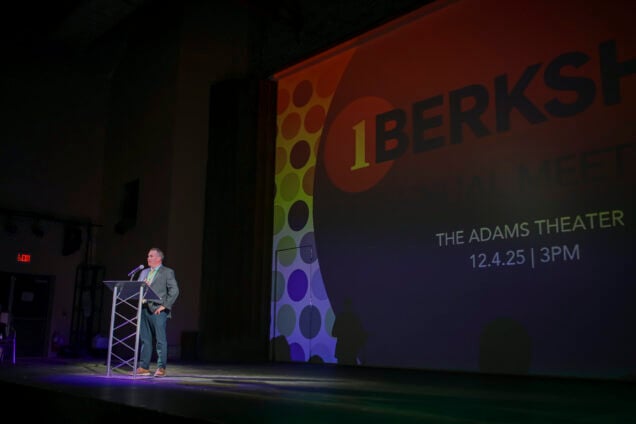Tech Impact Collaborative Advances Effort to Grow the Inclusive Digital Economy of the Berkshires
May 4, 2022 // News
For additional information, please contact:
Benjamin Lamb
1Berkshire Director of Economic Development
blamb@1berkshire.com
FOR IMMEDIATE RELEASE
Tech Impact Collaborative Advances Effort to Grow the Inclusive Digital Economy of the Berkshires
May 4th, 2022 – Berkshire County, MA – The Tech Impact Collaborative, an ongoing collaboration of 1Berkshire, the Berkshire Innovation Center (BIC), and the Osher Lifelong Learning Institute (OLLI) at BCC, is excited to share the successful completion of their initial two phases of work to grow a more inclusive digital and tech-enabled economy in the Berkshires. This collaborative of three organizations, initially formed in 2020, has held over a dozen classes, workshops, webinars and panels through the OLLI platform, engaging more than 1,000 individuals across the Berkshires and beyond. In September 2021, following the success of their various workshops and offerings, this dynamic collaborative, through staff capacity of 1Berkshire and the BIC, and volunteer capacity from OLLI, began working with the Center on Rural Innovation (CORI) through a facilitated assessment of the Digital Economy of the Berkshires. This assessment was immediately followed by a three-month-long series of deep dive strategy development workshops and focus groups with CORI, leading to the eventual establishment of a series of seven core strategies to grow the region’s digital economy over the next five years.
Thanks to the financial support of Greylock Federal Credit Union, National Grid, and Berkshire Bank, the Tech Impact Collaborative is now excited to share the results of its work to date as it begins the process of building an expanded network and programming Board of Directors. This Board will utilize the assessment and strategy as a scaffolding through which to develop and launch programs, efforts, and initiatives that tactically and strategically develop this emergent and high-growth industry set in the Berkshires, with a heavy focus on equity and support for populations historically underrepresented within this industry.
Both the assessment report and the seven core strategic components of this ongoing work are now publicly available on 1Berkshire’s website at https://1berkshire.com/tech-
Benjamin Lamb, 1Berkshire Director of Economic Development notes, “Working hand in hand with the Center on Rural Innovation has linked us to immense talent capacity and meaningful validation through an outside lens. To hear we are a prime candidate for scalable digital economy growth is not only reassuring, but also inspiring as we now seek to activate the opportunities in front of us.”
As the first two phases of this work came to a point of significant completion, the Tech Impact Collaborative also became new members of the Rural Innovation Network, a group of 26 rural regions and communities from across the country all tackling the issue of rural tech innovation and digital economy growth. Ben Sosne, Director of the Berkshire Innovation Center notes, “The caliber of work by CORI, and the access to a talented peer network from across the country, is truly laying a fantastic foundation for us to build off of. With our partners across the region, we can see how valuable and meaningful this work is, and how beneficial it will be as we launch into applying for funding to bring potential opportunities to reality.”
By making both the assessment and seven core strategies publicly available on the 1Berkshire website, the Tech Impact Collaborative hopes that a diverse breadth of individuals, organizations, and partners from across the region can leverage this quality resource to both join in on the collaborative’s work, and also take ownership and action through a collective impact approach.
About the Berkshire Innovation Center
The Berkshire Innovation Center serves as a catalyst to spark innovation and sustainable growth of technology-focused companies. We do this through programs that promote learning and enrich people in technology-led career paths and by providing research and innovation space for people and companies to explore new technologies, all while convening and connecting a community of like-minded people. For more information, visit: BerkshireInnovationCenter.com
About Osher Lifelong Learning Institute at Berkshire Community College
The Osher Lifelong Learning Institute at Berkshire Community College provides educational, social and volunteer opportunities designed especially by and for people fifty years and better in the Berkshires. OLLI offers five semesters of non-credit courses each year, as well as talks, special events and more. For additional information, visit: BerkshireOLLI.org
About the Center on Rural Innovation
The Center on Rural Innovation (CORI) was founded in 2017 to address the dramatic opportunity gap between rural and urban communities that grew out of the Great Recession. CORI is committed to advancing economic prosperity in rural America through the creation of inclusive digital economy ecosystems that support scalable entrepreneurship and tech job creation. To do this work, they partner with Rural Innovation Strategies, Inc. (RISI), a taxable nonprofit corporation using data-driven strategies, leading-edge geospatial tools, and digital economy expertise to advance their shared vision for rural equity and opportunity. For more information visit www.ruralinnovation.us.
###



